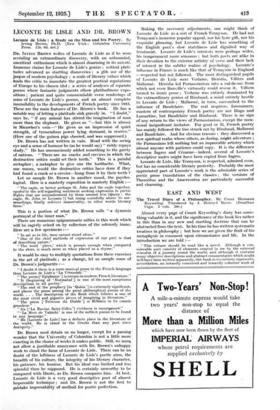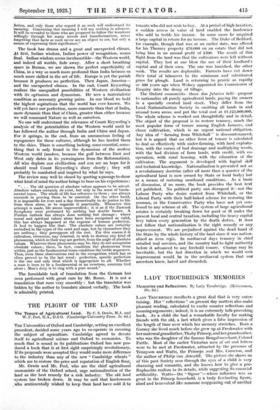EAST AND WEST
Almost every page of Count Keyserling's diary has.some- thing valuable in it, and the significance of the book lies rather in this than in any new and startling doctrine that can be abstracted from the text. In his time he has written systematic treatises in philosophy ; but here we are given the fruit of his metaphysic in conunent upon circumstance and life. In the introduction we are told :-
"This volume should be read like a novel. Although a con- siderable part consists of elements created in me by the external stimulus of a journey round the world, and although it contains many objective descriptions and abstract commentaries which might well have been written separately, this book in its entirety represents. nevertheless, an inwardly conceived and inwardly coherent work of
fiction, and only those who regard it as such will understand its meaning. Concerning this meaning I will say nothing in advance. It will be revealed to those who are prepared to follow the wanderer willingly through his many moods and transformations, never forgetting that facts as such never are an object to me, but only a means of expressing their significance."
The book has drama and a great and unexpected climax. At first, Indian wisdom, Indian power of recognition, seems final Indian wisdom seems inexhaustible—the Western world, and indeed all worlds, fade away. After a short breathing space in Burma, we are shown the perfect superficiality of China, in a way so much more profound than India because so much more skilled in the art of life. Europe is yet the pariah
because it produces no perfection. Then Japan, America—
and the unexpected climax. In the end, Count Keyserling realizes the unequalled possibilities of Western civilization with its optimism and dynamism. He sees a materialistic condition as necessary growing pains. In our blood we hold the highest aspirations that the world has ever known. We will yet have our perfection, more concrete than that of India, more dynamic than that of China, greater than either because we will command Nature as well as ourselves.
No one will understand the relevance of Count Keyserling's analysis of the potentialities of the Western world until he has followed the author through India and China and Japan. For it springs, in the end, from an unconscious feeling of repugnance for these cultures, although he has lauded them to the skies. There is something lacking, some essential, some- thing that is only found in the dynamism of the modern Western world (modern, because the gulf between East and West only dates in its yawningness from the Reformation). All who deplore our civilization and can see no hope for it should read Count Keyserling's diary closely ; they will probably be comforted and inspired by what he says.
The review may well be closed by quoting a passage to show what kind of mind the author brings to bear on his experiences :
" . . . The old question of absolute values appears to be solved. Absolute values certainly do exist, but only in the sense of funda- mental tones. The whole of life has reference to them ; one always succeeds in proving them to be essential. On the other hand, it is impossible for ever and a day theoretically to do justice to life from them alone, or to organize it practically. Whenever this attempt is made, life seems impoverished ; it is as if the Pastoral Symphony were performed by nothing but double basses. A Puritan outlook has always done nothing but damage ; where moral and spiritual values alone have been recognized as valid, this has always happened at the expense of human perfection. It had to happen like that. The absolute values are certainly embodied in the types of the saint and sage, but by themselves they are nothing ; they presuppose all the rest. • For this reason it is ridiculous, erroneous, nay criminal, to wish to destroy any kind of phenomena, which in their way are perfect, from the angle of absolute values. Whatever these phenoinena may be, they do not antagonise absolute values • these, in fact, condition the phenomena from within, just as the fundamental tones condition the treble sequences. Thus, even these observations end in the recognition which has so often proved to be the last word : perfection, specific perfection is the one and only ideal which is appropriate to all. Whether a man is born to be a fundamental or an overtone, concerns God alone ; Man's duty is to ring with a pure sound."
The formidable task of translation from the German has been performed with great care by Mr. Reece. It is not a translation that runs very smoothly : but the translator was bidden by the author to translate almost verbally. The book is admirably printed.











































 Previous page
Previous page